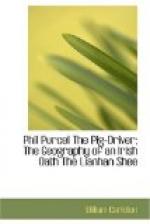Some of the Irish imprecations would appear to have come down to us from the Ordeals. Of this class, probably, are the following: “May this be poison to me!”—“May I be roasted on red hot iron!” Others of them, from their boldness of metaphor, seem to be of Oriental descent. One expression, indeed, is strikingly so. When a deep offence is offered to an Irishman, under such peculiar circumstances that he cannot immediately retaliate, he usually replies to his enemy—“You’ll sup sorrow for this!”—“You’ll curse the day it happened!”—“I’ll make you rub your heels together!” All those figurative denunciations are used for the purpose of intimating the pain and agony he will compel his enemy to suffer.
We cannot omit a form of imprecation for good, which is also habitual among the peasantry of Ireland. It is certainly harmless, and argues benevolence of heart. We mean such expressions as the following: “Salvation to me!—May I never do harm!—May I never do an ill turn!—May I never sin!” These are generally used by men who are blameless and peaceable in their lives—simple and well-disposed in their intercourse with the world.
At the head of those Irish imprecations which are dreaded by the people, the Excommunication, of course, holds the first and most formidable place. In the eyes of men of sense it is as absurd as it is illiberal: but to the ignorant and superstitious, who look upon it as anything but a brutum fulmen, it is terrible indeed.
Next in order are the curses of priests in their private capacity, pilgrims, mendicants, and idiots. Of those also Paddy entertains a wholesome dread; a circumstance which the pilgrim and mendicant turn with great judgment to their own account. Many a legend and anecdote do such chroniclers relate, when the family, with whom they rest for the night, are all seated around the winter hearth. These are often illustrative of the baneful effects of the poor man’s curse. Of course they produce a proper impression; and, accordingly, Paddy avoids offending such persons in any way that might bring him under their displeasure.
A certain class of cursers much dreaded in Ireland are those of the widow and the orphan. There is, however, something touching and beautiful in this fear of injuring the sorrowful and unprotected. It is, we are happy to say, a becoming and prominent feature in Paddy’s character; for, to do him justice in his virtues as well as in his vices, we repeat that he cannot be surpassed in his humanity to the lonely widow and her helpless orphans. He will collect a number of his friends, and proceed with them in a body to plant her bit of potato ground, to reap her oats, to draw home her turf, or secure her hay. Nay, he will beguile her of her sorrows with a natural sympathy and delicacy that do him honor; his heart is open to her complaints, and his hand ever extended to assist her.




